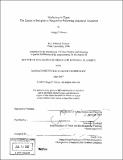| dc.contributor.advisor | Lawrence Susskind. | en_US |
| dc.contributor.author | Macey, Gregg P | en_US |
| dc.contributor.other | Massachusetts Institute of Technology. Dept. of Urban Studies and Planning. | en_US |
| dc.date.accessioned | 2008-01-10T16:05:32Z | |
| dc.date.available | 2008-01-10T16:05:32Z | |
| dc.date.copyright | 2007 | en_US |
| dc.date.issued | 2007 | en_US |
| dc.identifier.uri | http://hdl.handle.net/1721.1/39943 | |
| dc.description | Thesis (Ph. D.)--Massachusetts Institute of Technology, Dept. of Urban Studies and Planning, 2007. | en_US |
| dc.description | Includes bibliographical references (p. 265-289). | en_US |
| dc.description.abstract | This study grew out of an interest in environmental justice and the unique problems faced by neighborhoods located near petrochemical facilities. It also focuses on negotiation theory and how it can be applied under an increasingly diverse array of circumstances. I sketch the roots of the concept of integrative bargaining and how it emerged as a powerful yet limited tool for meeting the interests of stakeholders in multi-party contexts. Specifically, I demonstrate how research into the structure of conflict, with origins in contract and game theory, encouraged a new profession that focuses much of its time, paradoxically, on matters of agency, such as the strategic elements widely viewed as conducive to a Pareto efficient outcome. In an effort to encourage a renewed focus on structure, I show how in a highly institutionalized setting, which for my dissertation included the causes and immediate consequences of an accidental toxic emission by a chemical processing facility, much of the integrative potential of the negotiations that follow is removed from potential discussion or even discovery before mediators and the parties involved begin to address root causes. | en_US |
| dc.description.abstract | (cont.) New roles for mediators, and why it is as important to focus on limiting the narrowing effects of structuration as it is to try and expand the initial offer space, are discussed. Data for my dissertation include semi-structured interviews with over 90 agency and industry representatives, residents and community organizers, and the lawyers and mediators who were also a part of the conflicts that followed accidents such as the Unocal Catacarb spill. I also collected primary documents, including environmental data, deposition transcripts analyzed to determine the organizational roots of the accidents, plant management and government agency records, media accounts, and drafts of community-corporate agreements. | en_US |
| dc.description.statementofresponsibility | by Gregg P. Macey. | en_US |
| dc.format.extent | 289 p. | en_US |
| dc.language.iso | eng | en_US |
| dc.publisher | Massachusetts Institute of Technology | en_US |
| dc.rights | M.I.T. theses are protected by copyright. They may be viewed from this source for any purpose, but reproduction or distribution in any format is prohibited without written permission. See provided URL for inquiries about permission. | en_US |
| dc.rights.uri | http://dspace.mit.edu/handle/1721.1/7582 | |
| dc.subject | Urban Studies and Planning. | en_US |
| dc.title | Sheltering in place : the limits of integrative bargaining following industrial accidents | en_US |
| dc.type | Thesis | en_US |
| dc.description.degree | Ph.D. | en_US |
| dc.contributor.department | Massachusetts Institute of Technology. Department of Urban Studies and Planning | |
| dc.identifier.oclc | 182858722 | en_US |
